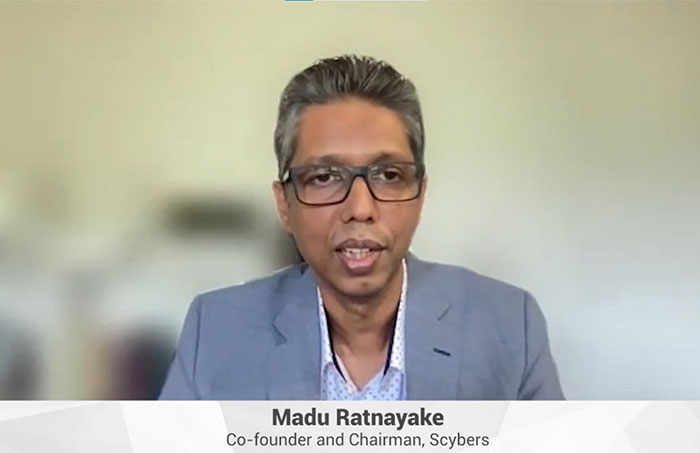Business
‘National Future Talent Initiative aimed at creating IT-capable younger generation’

By Hiran H. Senewiratne
The National Future Talent Initiative (NFTI) will assist in the IT/ Business Process Outsourcing (BPO) fields and enable our younger generations to be equipped with the skills relevant to the future job market, a top IT specialist said.
NFTI steering committee chair Madu Ratnayake announcing the rationale for the NFTI program said that the initiative aims to build awareness among 100,000 students and 50,000 potential BPO professionals on career opportunities in the knowledge industry with the aim of attracting new talent.
“The key goals are getting 500 people into part-time teaching to build the local teaching capacity, 5,000 people into freelance work to capitalize on immediate work opportunities in the field and to enable 200 companies to offer internships to give a head start to the new talent generated from the initiative, thus lay the foundation for a progressive talent development ecosystem for the future, Ratnayake said at the launch of the program. The event was held at Cinnamon Grand Hotel on Wednesday.
“The project was launched to encourage more people to join the IT/BPM workforce and to invite interested parties to join hands in creating a steady stream of talent entering this lucrative industry, presenting the goals of the program Ratnayake said.
“The industry envisages further growth and aims to establish 1,000 start-ups, create 200,000 jobs and grow industry revenue to US$ 5 billion, he said.
As per a recent IMF report, it is predicted there will be a global shortage of more than 85 million tech workers, representing US $ 8.5 trillion in lost annual revenue by 2030. Sri Lanka currently has around 600+ companies in its IT / BPM eco-system, generating US$ 1.7 billion in revenue.
CEO, GTN Technologies and Head of Global Shared Services, GTN Group and steering committee member NFTI Arjuna Nanayakkara said: “The IT/ BPM industries offer many career choices for those who have a passion for technology, problem-solving and are analytical- minded. It is for school leavers, fresh graduates as well as seasoned professionals. The IT/ BPM sector provides career opportunities in which they can leverage their core field of knowledge.”
“For example, there are BPM companies that provide services in health care, finance and law where doctors, nurses, lawyers and accountants who are passionate about technology can have a career in tech, using their core skill set, Nanayakkara added.
Business
Sri Lanka betting its tourism future on cold, hard numbers

National Airport Exit Survey tells quite a story
Australia’s role here is strategic, not charitable
In a quiet but significant shift, Sri Lanka’s tourism sector is moving beyond traditional destination marketing and instinct-based planning. The recent launch of the “From Data to Decisions” initiative jointly backed by Australia’s Market Development Facility and the Sri Lanka Tourism Development Authority, sent an unambiguous message: sentiment is out, statistics are in.
The initiative is anchored by a 12-month National Airport Exit Survey, a trove of data covering 16,000 travellers. The findings sketch a new traveller profile: nearly half are young (20–35), independent, and book online. Galle, Ella, and Sigiriya are the hotspots; women travellers outnumber men; and a promising 45% plan to return. This isn’t just trivia. It’s a strategic blueprint. If Sri Lanka Tourism listens, it can tailor everything from infrastructure to marketing, moving from guesswork to precision.
The keynote speaker, Deputy Minister Prof. Ruwan Ranasinghe called data “a vital pillar of tourism transformation.” Yet the unspoken truth is that Sri Lanka has long relied on generic appeals -beaches, heritage, smiles. In today’s crowded market, that’s no longer enough. As SLTDA Chairman Buddhika Hewawasam noted, this partnership is about “elevating how we collect, analyse, and use data.”
Australia’s role here is strategic, not charitable. By funding research and advocating for a Tourism Satellite Account, it is helping Sri Lanka build a tourism sector that is both sustainable and measurable. Australian High Commissioner Matthew Duckworth linked this support to “global standards of environmental protection” – a clear nod to the growing demand for green travel. This isn’t just aid; it’s influence through insight.
“The real test lies ahead,” a tourism expert told The Island. “Data is only as good as the decisions it drives. Will these insights overcome bureaucratic inertia? Will marketing budgets actually follow the evidence toward younger, independent, female travellers?,” he asked.
“The comprehensive report promised for early 2026 must move swiftly from recommendation to action. In an era where destinations are discovered on Instagram and planned with algorithms, intuition alone is a high-stakes gamble. This forum made one thing clear: Sri Lanka is finally building its future on what visitors actually do – not just what we hope they’ll do. The numbers are in. Now, the industry must dare to follow them,” he said.
By Sanath Nanayakkare
Business
New ATA Chair champions Asia’s small tea farmers, unveils ambitious agenda

In his inaugural address as the new Chairman of the Asia Tea Alliance (ATA), Nimal Udugampola placed the region’s millions of smallholders at the core of the global tea industry’s future, asserting they are the “indispensable engine” of a sector that produces over 90% of the world’s tea.
Udugampola, who is also Chairman of Sri Lanka’s Tea Smallholdings Development Authority, used his speech at the 6th ATA Summit held in Colombo on Nov. 27 to declare that the prosperity of Asian tea is “entirely contingent” on the resilience of its small-scale farmers, who have historically been overlooked by premium global markets.
“In Sri Lanka, smallholders account for over 75% of our national production. Across Asia, millions of families maintain the quality and character of our regional teas,” he stated, accepting the chairmanship for the 2025-2027 term.
To empower this vital community, Udugampola unveiled a vision focused on Sustainability, Equity, and Digital Transformation. The strategic agenda includes:
Climate Resilience: Promoting climate-smart agriculture and regenerative farming to protect smallholdings from environmental disruption.
Digital Equity: Leveraging technology like blockchain to create farm-to-cup traceability, connecting smallholders directly with premium consumers and ensuring fair value.
Market Expansion: Driving innovation in tea products and marketing to attract younger consumers and enter non-traditional markets.
Standard Harmonization: Establishing common regional quality and sustainability standards to protect the “Asian Tea” brand and push for stable, fair pricing.
Linking the alliance’s goals to national ambition, Udugampola highlighted Sri Lanka’s target of producing 400 million kilograms of tea by 2030. He presented the country’s “Pivithuru Tea Initiative” as a model for other ATA nations, designed to achieve this through smallholder empowerment, digitalization, and aligned policy objectives.
By Sanath Nanayakkare
Business
Brandix recognised as Green Brand of Year at SLIM Awards 2025

Brandix Apparel Solutions was recognised as the Green Brand of the Year at the Sri Lanka Institute of Marketing (SLIM) Brand Excellence Awards 2025, taking home Silver, the highest award presented in the category this year.
The ‘Green Brand of the Year’ recognises the brand that drives measurable environmental impact through sustainable practices, climate-aligned goals and long-term commitment to protecting natural resources.
A pioneer in responsible apparel manufacturing for over two decades, Brandix has championed best practices in the sphere of sustainable manufacturing covering environmental, social, and governance aspects. The company built the world’s first Net Zero Carbon-certified apparel manufacturing facility (across Scope 1 and Scope 2) and meets over 60% of its energy requirement in Sri Lanka via renewable sources.
Head of ESG at Brandix, Nirmal Perera, said: “Being recognised as Green Brand of the Year is an encouraging milestone for our teams working across sustainability.”
-
News5 days ago
Lunuwila tragedy not caused by those videoing Bell 212: SLAF
-

 News11 hours ago
News11 hours agoOver 35,000 drug offenders nabbed in 36 days
-

 News4 days ago
News4 days agoLevel III landslide early warning continue to be in force in the districts of Kandy, Kegalle, Kurunegala and Matale
-

 Latest News7 days ago
Latest News7 days agoLevel III landslide early warnings issued to the districts of Badulla, Kandy, Kegalle, Kurunegala, Matale and Nuwara-Eliya
-

 Features6 days ago
Features6 days agoDitwah: An unusual cyclone
-

 Business2 days ago
Business2 days agoLOLC Finance Factoring powers business growth
-

 News2 days ago
News2 days agoCPC delegation meets JVP for talks on disaster response
-

 News2 days ago
News2 days agoA 6th Year Accolade: The Eternal Opulence of My Fair Lady














